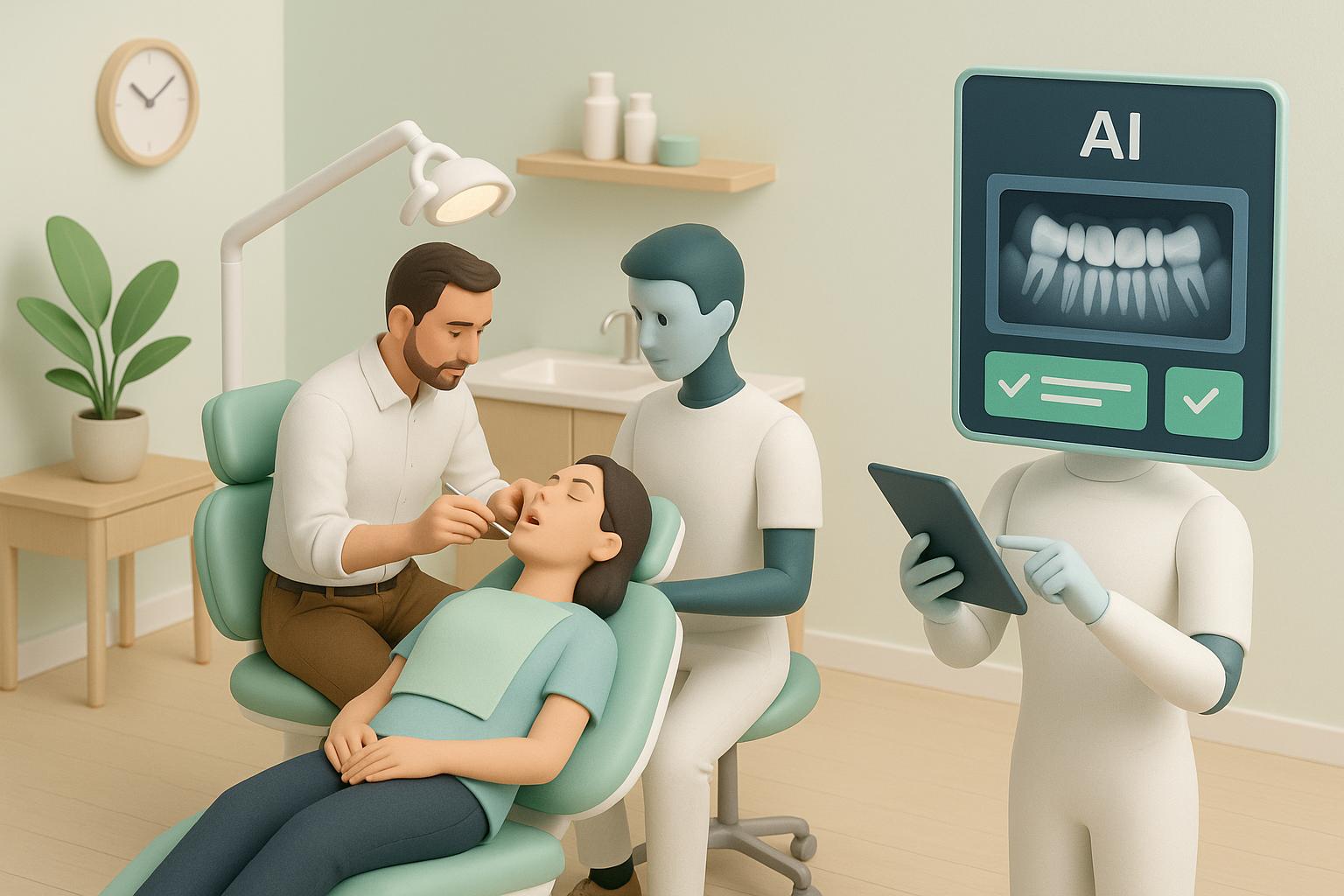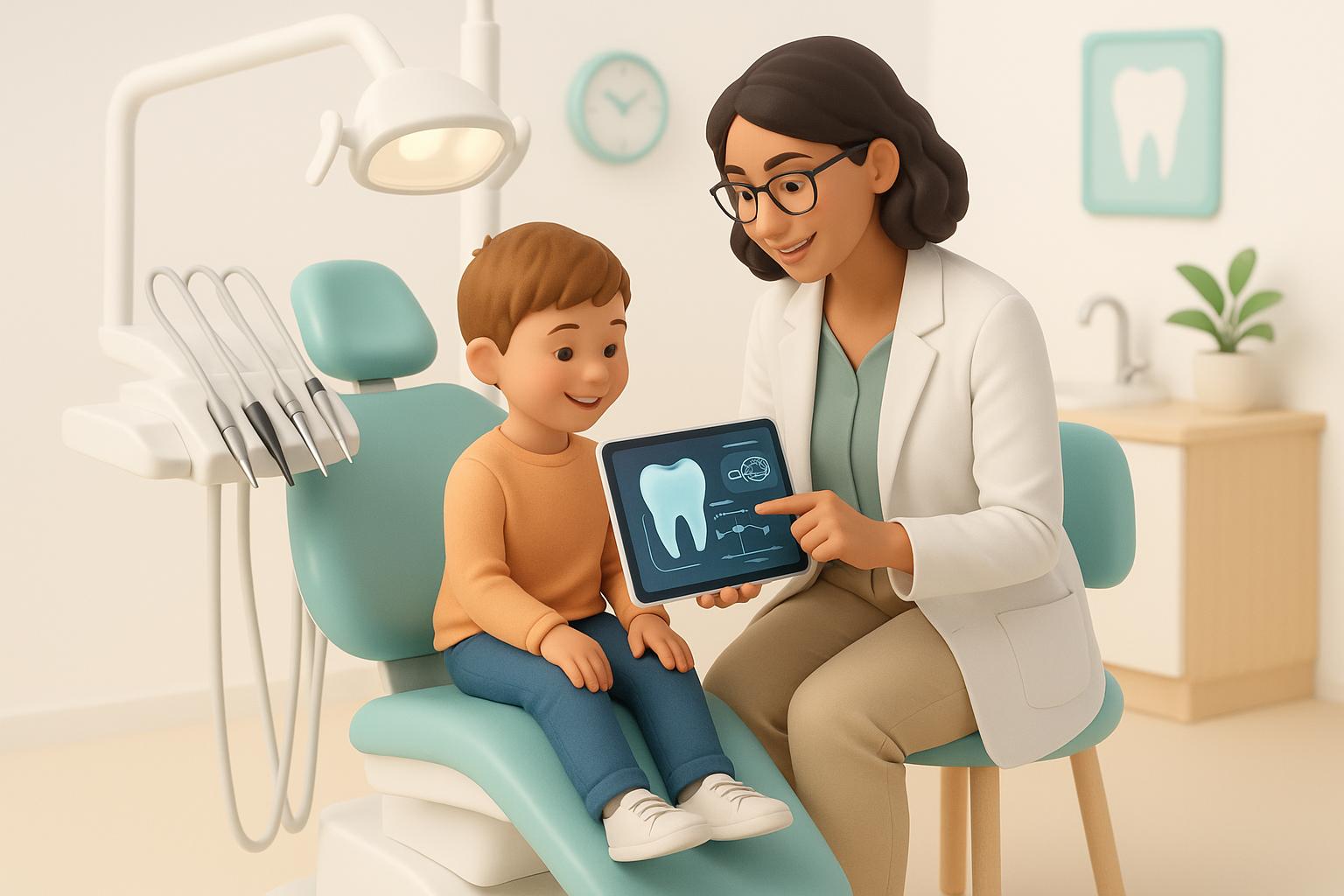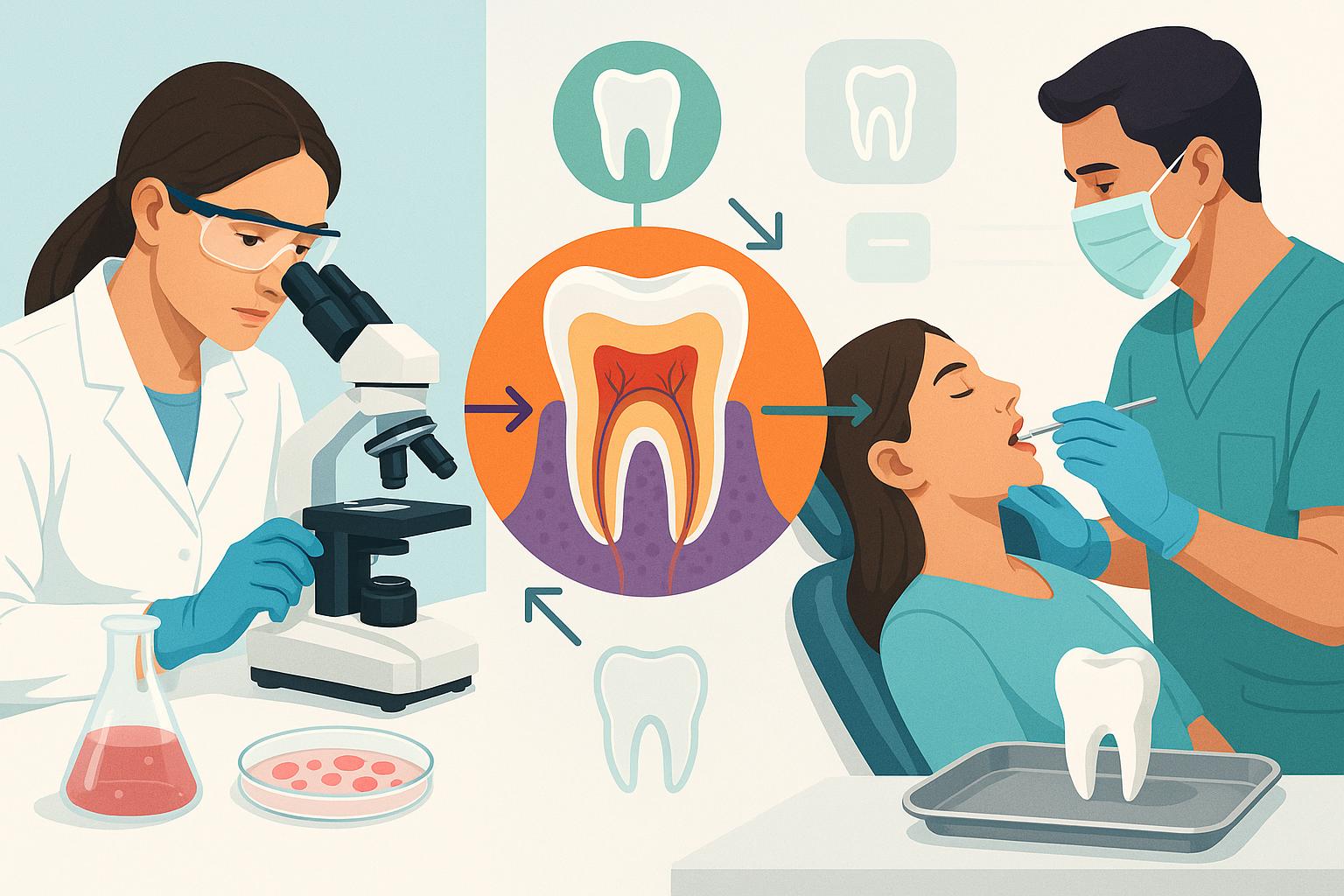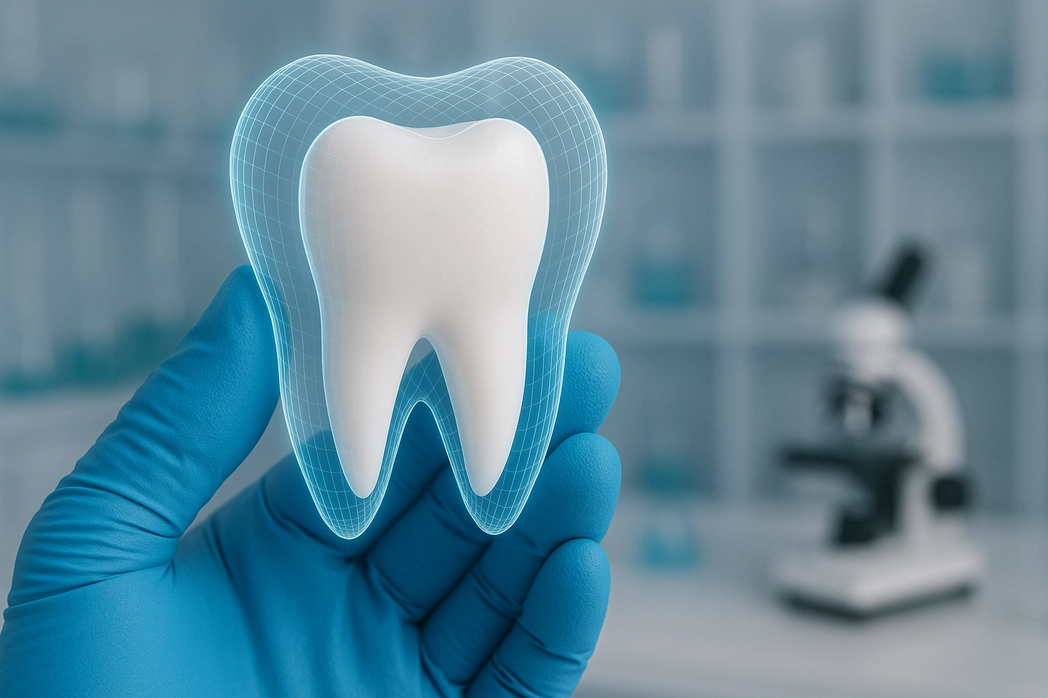Will Dentists Be Replaced by AI? What Clinics Need to Know
No, dentists won’t be replaced by AI. While AI is transforming dental practices by automating routine tasks like scheduling, billing, and imaging analysis, it cannot perform hands-on treatments or provide the personal care patients expect. AI tools, such as diagnostic imaging software with over 90% accuracy, assist in identifying issues like cavities and periodontal disease. However, complex cases, patient reassurance, and procedures still require the skill and judgment of a human dentist.
Key takeaways:
- AI excels in admin tasks: Automates scheduling, reminders, billing, and documentation.
- Supports clinical work: AI tools help with diagnostics but fall short in handling complex conditions or emergencies.
- Dentists remain essential: Tasks like surgical procedures, patient interaction, and compliance require human expertise.
AI enhances clinic efficiency, freeing up dentists to focus on patient care. The future lies in combining AI’s capabilities with the irreplaceable skills of dental professionals.
The Future of Dentistry: AI, Automation, and the End of Legacy Systems
Introduction: The AI Question in Dentistry
Will dentists be replaced by AI? This question has sparked concern among clinic owners in the UAE, MENA, and EU regions. As artificial intelligence continues to reshape industries, dental professionals are left wondering if their skills and expertise could become less relevant. The rise of AI in dentistry is already driving changes in how clinics operate and how care is delivered to patients.
AI is making its mark by automating routine tasks. Tools powered by AI are handling responsibilities like appointment scheduling and billing, freeing up time for dentists to focus on what matters most - providing personalised care to their patients.
With these automated systems becoming more common, it’s worth examining which aspects of dentistry are best left to human hands. After all, dental care requires a combination of physical precision, emotional understanding, and complex decision-making - qualities that AI simply cannot replicate. For instance, no robot can perform invasive procedures or offer comfort to a nervous patient in the chair.
For clinic owners in cities like Dubai and Abu Dhabi, the goal isn’t to replace dentists but to enhance their work with AI tools. Many practices are already embracing management software that helps deliver more personalised care while maintaining the human connection patients value. This shift highlights the importance of identifying tasks where human expertise is irreplaceable.
While AI is streamlining operations behind the scenes, the core clinical responsibilities remain firmly in the hands of skilled professionals. Forward-thinking clinic owners are investing in technology that complements their teams, ensuring a future where AI supports - not replaces - the expertise and care that define dentistry.
Will Dentists Be Replaced by AI?
No, dentists will not be replaced by AI. Artificial intelligence is reshaping dental practices across the UAE and beyond, but it functions as a support system rather than a replacement for human expertise. While AI enhances diagnostics and simplifies workflows, complex dental procedures still rely on human judgment and manual skill.
What AI Brings to Dentistry
AI has made impressive advances in diagnostic imaging and automating routine tasks. For instance, AI-powered tools can now detect dental caries and periodontal disease with over 90% accuracy when analysing panoramic radiographs, matching the precision of expert clinicians [3][7].
Take Overjet’s Dental Assist software as an example. This FDA-cleared tool measures bone levels for periodontal disease with an average deviation of just 0.3 mm compared to expert analysis [7]. Such precision allows dentists to identify issues early and plan treatments more effectively.
Beyond diagnostics, AI optimises administrative tasks. Tools like Bola AI’s Voice Perio enable hands-free charting and automatic transcription of clinical notes, cutting down on paperwork [7]. AI chatbots have also proven effective for appointment scheduling, helping clinics reduce operational costs by up to 25% and missed appointments by 15% [8]. Additionally, AI-driven billing systems have sped up processing times by 40% and reduced billing errors by 15% [8].
In orthodontics, AI predicts treatment outcomes with 73% accuracy [3]. This helps dentists set realistic expectations and craft tailored treatment plans.
While these innovations improve efficiency, they complement rather than replace the clinical expertise of dentists.
Why Dentists Are Irreplaceable
Even with AI’s advancements, the nuanced care and manual skill of human dentists remain essential.
For example, the same Polish study that highlighted AI’s diagnostic accuracy found that while AI excelled in detecting caries and periodontal disease, it struggled with more complex conditions like endodontic lesions and crowns, achieving only 65.3% accuracy [3]. Such cases require the expertise of a trained dentist to interpret and address.
Moreover, patient care goes beyond technical precision. Nervous patients often need reassurance, children require a gentle approach, and elderly patients may need extra time and clear explanations. These human interactions are critical to treatment success and cannot be replicated by algorithms.
Manual procedures also demand dexterity and on-the-spot decision-making that robots currently cannot provide. While robotic-assisted dental procedures in 2024 reduced errors by 20% and operation times by 15% [8], these systems still depend on skilled human operators for guidance and oversight.
Additionally, regulatory frameworks in Dubai emphasise the necessity of human oversight. AI can assist with documentation and flagging potential issues, but qualified dentists are required to interpret these outputs and ensure patient safety [4][5].
Dental emergencies - like severe facial swelling, unusual pain, or medication complications - often demand immediate human intervention. These unpredictable scenarios require a level of adaptability and quick decision-making that AI simply cannot match.
Most dental experts agree: AI will enhance, not replace, the role of dentists [1][4][5]. The technology boosts efficiency and accuracy but falls short of replicating the clinical judgment, empathy, and adaptability that define quality dental care. The future lies in blending AI tools with the human expertise that patients trust and value.
Will Robots or AI Take Over Dental Assistants and Staff Roles?
AI can handle admin tasks but falls short in human-centric patient care. While artificial intelligence is reshaping dental clinic operations, its strength lies in automating routine tasks, allowing staff to dedicate more time to patient interaction and complex procedures.
Tasks AI Can Automate
AI shines when it comes to repetitive administrative duties that often consume valuable time. For instance, appointment scheduling and billing are areas where automation has proven highly effective. Tools like Remedico’s Smart Calendar can automatically manage bookings, send reminders, handle cancellations, and even verify patient details. This not only reduces errors but also speeds up claim processing and payment cycles.
Patient communication also benefits from automation. AI-powered chatbots can answer common questions about clinic hours, services, and appointment availability. Additionally, Remedico’s Retention AI™ sends follow-up messages and treatment reminders, ensuring patients stay engaged 24/7.
When it comes to documentation and record-keeping, AI tools like RemedicoGPT™ streamline the process by generating reports, filling out forms, and organising patient data in seconds. This is especially helpful in busy practices where excessive paperwork can slow down patient care.
However, while AI efficiently handles these tasks, roles that require human intuition, empathy, and adaptability remain irreplaceable.
Roles That Still Need Humans
Patients value personal interaction, reassurance, and clear communication. These elements foster trust and encourage treatment compliance - qualities that no algorithm can replicate.
Chairside assistance during dental procedures is another area where humans excel. Dental assistants must respond in real time, anticipate the dentist’s needs, adjust equipment, and handle unexpected situations - skills that AI or robots cannot currently match.
Oversight for compliance with systems like NABIDH and Riayati also requires human involvement. While AI can flag potential issues, human staff must interpret and ensure adherence to regulations.
Emergency response situations, such as adverse reactions or complications, demand immediate human judgment and a trained response - something AI cannot yet provide.
Lastly, quality control tasks like sterilisation, equipment checks, and infection control require human oversight. Trained staff can identify issues, make necessary adjustments, and maintain safety standards for patients.
AI vs. Human Staff: Strengths Comparison
Capability | AI Strengths | Human Staff Strengths |
|---|---|---|
Speed | Processes data instantly and manages multiple tasks simultaneously | Adapts quickly to unexpected situations and offers personal attention |
Accuracy | Delivers consistent performance in routine tasks, minimising errors | Interprets complex scenarios and applies clinical judgment |
Availability | Operates around the clock, handling after-hours inquiries | Builds long-term relationships and remembers individual patient preferences |
Cost | Reduces operational expenses and scales without additional salaries | Provides personalised care and handles sensitive situations with empathy |
Compliance | Flags regulatory issues and ensures consistent documentation | Interprets rules and takes accountability for decisions |
The most successful dental practices combine AI’s efficiency with the empathy and expertise of human staff. By automating time-consuming tasks, AI reduces staff burnout and enhances clinic operations. Meanwhile, team members can focus on patient care, complex procedures, and fostering relationships that drive the clinic’s growth. Remedico’s integrated solutions - like Smart Calendar, RemedicoGPT™, and Retention AI™ - work hand-in-hand with human expertise to create a well-rounded, efficient approach to patient care.
sbb-itb-d8b42ea
What the 80/20 Rule in Dentistry Tells Us About AI’s Future
The 80/20 rule (Pareto Principle) highlights how AI can take over routine tasks, giving dentists more time to focus on diagnostics and hands-on care. By understanding this balance, clinic owners can make smarter decisions about where to integrate AI and where human expertise remains essential. The aim isn’t to replace dentists - it’s to free them from time-consuming administrative duties.
Applying the 80/20 Rule in Clinics
Many dental practices spend too much time on administrative work instead of patient care. Tasks like booking appointments and verifying insurance details are repetitive and can easily be automated.
On the other hand, critical responsibilities - like diagnosing conditions, planning treatments, performing surgeries, managing complications, and building trust with patients - require years of training and hands-on expertise. These are areas where AI can’t substitute human skills.
By automating admin tasks, clinics can shift their focus to patient care. This means more time for in-depth consultations, advanced treatments, or even professional development. For both patients and practitioners, this redistribution of effort can lead to better outcomes and a more rewarding experience.
In many clinics across Dubai, a large chunk of staff time is spent on administrative processes rather than patient interaction. Automating these repetitive tasks allows clinics to direct more energy toward improving patient care, enhancing treatment quality, and growing their practice. This shift not only sharpens clinical focus but also positions AI as a tool for operational improvement.
How AI Tools Support Efficiency
Dental software is designed to handle routine tasks, leaving dentists free to focus on clinical decisions. Tools like Smart Calendar and RemedicoGPT™ streamline scheduling, documentation, follow-ups, and billing, while dentists retain full control over patient care.
- RemedicoGPT™ simplifies documentation by generating treatment notes, insurance forms, and patient summaries in minutes. Dentists review and approve these outputs, saving time for more complex tasks.
- Retention AI™ tackles follow-ups by sending personalised reminders at optimal times, boosting compliance compared to manual methods.
- The Patient Flow™ system tracks every step of a patient’s journey - from their initial inquiry to completed treatment. This helps clinics identify where patients might lose interest and make small adjustments to improve case acceptance rates.
- Billing automation handles insurance claims, payments, and financial reports - areas that often slow down operations. Automating these processes reduces errors, speeds up revenue collection, and ensures compliance with local regulations like NABIDH and Riayati.
The biggest advantage lies in striking the right balance: routine tasks are automated, but human oversight remains essential. Dentists stay focused on clinical decisions and patient care while leaving scheduling headaches, paperwork, and follow-up reminders to AI tools. This approach not only improves efficiency but also ensures that patient relationships and care quality remain a top priority.
Comparing Dentistry with Other Fields: Will AI Replace Doctors, Lawyers, or Accountants?
AI’s growing role in routine dental tasks invites comparisons with its impact across other industries. While automation is reshaping various sectors, the balance between human expertise and machine efficiency varies. Let’s explore how dentistry fits into this broader landscape.
AI in Healthcare vs. Other Professions
Across industries like healthcare, accounting, and law, AI is increasingly automating repetitive tasks. However, when it comes to complex decision-making - whether clinical, financial, or legal - human expertise remains irreplaceable.
For example, radiologists use AI to detect early-stage cancers in imaging scans, while dermatologists rely on similar tools for identifying skin abnormalities. In accounting, platforms like QuickBooks and Xero handle bookkeeping, tax calculations, and financial reporting. Yet, tasks like strategic tax planning and business advisory still demand human insight.
In the legal field, tools such as LexisNexis and Westlaw streamline document reviews and contract analysis. However, courtroom advocacy, client counselling, and intricate legal strategies remain firmly in human hands.
Dentistry occupies a unique position. Like other healthcare fields, it involves direct patient care and physical procedures that AI cannot perform. Dentists also make real-time decisions during treatments, requiring a level of dexterity and judgement that machines cannot replicate. Moreover, the trust between dentist and patient creates a natural barrier to full automation.
Automation Potential Across Industries
The degree to which AI can automate tasks varies widely across professions. Below is a comparison of automation potential in dentistry, general medicine, accounting, and law:
Profession | High Automation Capability | Medium Automation Capability | Low Automation Capability |
|---|---|---|---|
Dentistry | Appointment scheduling, billing, insurance claims, patient reminders | X-ray analysis, treatment planning assistance, documentation | Clinical procedures, patient communication, diagnosis, emergency care |
General Medicine | Administrative tasks, prescription refills, basic symptom checking | Diagnostic imaging analysis, lab result interpretation | Complex diagnosis, surgery, patient counselling, emergency medicine |
Accounting | Bookkeeping, tax calculations, expense tracking, payroll processing | Financial analysis, audit preparation, compliance reporting | Strategic planning, client advisory, complex tax situations |
Legal | Document review, contract analysis, legal research, case law searches | Brief writing assistance, due diligence, regulatory compliance | Courtroom advocacy, client counselling, negotiation, legal strategy |
This comparison underscores a key point: while AI excels at automating administrative and analytical tasks, it struggles with roles requiring nuanced judgement, human interaction, and adaptability. In dentistry, these core clinical responsibilities remain firmly within the human domain.
Factors Slowing AI Adoption in Dentistry
Several factors influence how quickly AI is adopted across industries, particularly in healthcare:
- Regulations: In the UAE, frameworks like NABIDH and Riayati ensure healthcare providers maintain control over patient data and treatment decisions. These safeguards are less stringent in fields like accounting or legal research.
- Cost: Legal AI tools often require modest investments, while dental technologies for clinical support involve higher costs, additional training, and regulatory approvals.
- Timelines: Sectors like accounting have embraced AI swiftly, but healthcare - including dentistry - requires extensive testing, regulatory clearance, and practitioner training, slowing the pace of adoption.
In dentistry, AI’s role is likely to evolve gradually, focusing on administrative efficiency rather than replacing clinical expertise. Tools like Remedico exemplify this trend, automating routine tasks while leaving the essential human element of patient care untouched. Ultimately, the integration of AI in dentistry will enhance support systems without compromising the personal connection at the heart of the profession.
Why Human Dentists Will Remain Necessary Despite AI Advances
While AI has transformed many industries by automating routine tasks, dentistry remains a domain where human expertise is irreplaceable. The profession requires a blend of technical ability, empathy, and quick decision-making - qualities that AI simply cannot replicate.
Building Patient Trust and Care
At the heart of effective dental care lies the human connection. Patients often rely on the reassurance, empathy, and personalised communication that only a dentist can provide. These elements foster trust and make dental visits less intimidating.
“Regardless of AI’s advancements, it cannot replicate the fine motor skills, adaptability or emotional awareness required in clinical dentistry.” - Dr Ali Nankali [9]
Take complex procedures like root canals or dental implants, for instance. These treatments demand precise manual control and the ability to make split-second adjustments. Dentists rely on tactile feedback and auditory cues to sense resistance and adjust their approach accordingly - tasks no algorithm can handle [2].
In emergency situations, the need for human judgment becomes even more apparent. Whether dealing with an allergic reaction or a sudden equipment malfunction, dentists must think on their feet, combining creativity with decisive action [6].
Another critical aspect is cultural sensitivity, especially in diverse regions like the UAE. Understanding local customs and communication styles helps dentists ensure patient comfort and build trust, which is vital in a multicultural setting.
Beyond patient care, dentists also play a crucial role in ensuring that their practices comply with UAE’s strict regulations.
Meeting Compliance with Local Regulations
Once trust is established through compassionate care, dentists must navigate the UAE’s stringent regulatory environment. Systems like NABIDH and Riayati require human oversight to ensure patient care aligns with local guidelines. While AI can assist with data processing, the responsibility for compliance ultimately rests with the dentist.
Treatment planning and quality assurance are particularly reliant on human judgment. Dentists must consider a combination of factors, including a patient’s medical history, financial situation, and personal preferences, to create tailored care plans. These decisions require an ongoing evaluation process that AI cannot fully manage [2].
“AI will not take away jobs, but it will take over some tasks at work. This lets people do what only they can do, like build good relationships, use their own judgment, and show care for others.” - Kai-Fu Lee, AI researcher [2]
Ethical considerations also highlight the irreplaceable role of human dentists. Discussions about treatment options, costs, and potential outcomes often involve interpreting non-verbal cues and exercising compassion. These conversations demand a level of emotional intelligence and cultural understanding that remains uniquely human [9].
“The nuanced clinical decisions you make every day, the way you calm an anxious child, the split second judgment calls during procedures aren’t getting automated anytime soon.” - Harbor Dental Society [10]
The future of dentistry isn’t about replacing human expertise but enhancing it. Tools like Remedico can take on routine tasks, freeing up dentists to focus on what they do best - providing personalised, empathetic care that ensures both effectiveness and patient comfort.
Key Takeaways
Here’s a breakdown of the main points for clinics:
AI is a tool, not a replacement for dentists. While AI can handle routine tasks like scheduling appointments or analysing diagnostic images, it cannot replicate the expertise required for complex procedures or the personal connection dentists build with patients[1].
Clinics embracing AI see measurable improvements. From detecting cavities to identifying oral cancer with impressive accuracy, AI-powered diagnostic tools not only enhance operational efficiency but also boost patient satisfaction[3][8].
Empathy and clinical judgment remain irreplaceable. No matter how advanced technology becomes, human skills like trust-building, tactile feedback during procedures, and quick decision-making are critical and cannot be automated[1][6].
Lagging behind in AI adoption poses risks. Clinics that resist integrating AI tools may struggle to compete with tech-savvy competitors who leverage these advancements to improve their services[4].
The future is a partnership between AI and human expertise. Successful clinics use AI for tasks like diagnostics, administration, and compliance while focusing on in-person consultations and compassionate care to maintain strong patient relationships[3][4].
FAQs
How can AI tools help my dental practice run more efficiently while maintaining high patient care standards?
AI tools can transform the way your dental practice operates by taking over repetitive administrative tasks such as scheduling appointments, sending reminders, and managing patient records. This not only lightens the load for your staff but also helps minimise missed appointments, creating a more seamless experience for both patients and your team.
Additionally, AI-powered virtual assistants and chatbots can provide 24/7 support by answering patient queries instantly. This allows your staff to concentrate on more specialised, patient-centric responsibilities. By simplifying these processes, AI helps your team focus on delivering exceptional care, which can lead to higher patient satisfaction and better overall outcomes. :::
Can AI handle complex dental procedures, or will human dentists always be needed?
AI has brought notable progress to the field of dentistry, especially in areas like diagnostics, automating administrative tasks, and spotting issues early on. Yet, when it comes to handling intricate dental procedures, it simply can’t replace human expertise. AI doesn’t possess the hands-on precision, nuanced decision-making, or the emotional understanding that dentists bring to their practice.
While AI can streamline routine processes, the presence of human dentists is irreplaceable. They ensure patient safety, address unexpected complications, and deliver tailored care. This underscores the indispensable role dentists play in guiding treatments and fostering trust with their patients. :::
How can dental clinics use AI while staying compliant with regulations like NABIDH and Riayati?
To integrate AI while adhering to UAE regulations like NABIDH and Riayati, dental clinics should focus on a few essential steps:
- Select software that complies with regulations: Choose AI tools that are specifically designed to meet NABIDH and Riayati standards. This includes features like secure patient data management and audit trail functionalities.
- Educate your team: Equip your staff with training on data privacy protocols and responsible use of AI tools to ensure regulatory compliance.
- Keep up with changes: Regularly update your AI software and review your compliance procedures to stay aligned with any updates in local regulations.
For added assurance, consider consulting with legal or regulatory professionals. Their expertise can help your clinic navigate UAE healthcare laws and minimise compliance risks. :::




